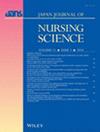Association among cognitive function, daytime activities, and nighttime sleep in older adults in a long-term care facility
Abstract
Aim
To determine how the nighttime sleep patterns of older adults in a long-term care facility vary according to cognitive function and participation in daytime activities.
Methods
This observational study was conducted with older adults aged ≥65 years who are residents of a long-term care facility. Nighttime sleep was monitored using a non-wearable sleep monitor for 8 weeks. Based on the Mini-Mental State Examination scores for assessment of cognitive function, participants were classified into non-dementia, mild-to-moderate dementia, and severe dementia groups. The Mann–Whitney U test and Kruskal–Wallis test were used to analyze the data.
Results
Twenty three older adults were included in this study. Sleep onset latency was significantly longer in the severe dementia group than in the non-dementia (p = .027) and mild-to-moderate dementia (p = .041) groups. Sleep efficiency was significantly lower in the severe dementia group than in the mild-to-moderate dementia group (p = .003), whereas wakefulness after sleep onset was significantly longer in the severe dementia group than in the mild-to-moderate dementia group (p = .011). The number of days spent engaging in recreational activities was <50%, whereas those spent taking a nap was >60% in all older adults. Older adults with mild-to-moderate dementia had better sleep and participated in more daytime activities than those with severe or no dementia. Moreover, bathing in a bathtub improved sleep onset latency.
Conclusions
This study demonstrates that participation in daytime activities and bathing in a bathtub affect nighttime sleep in older adults.

 求助内容:
求助内容: 应助结果提醒方式:
应助结果提醒方式:


